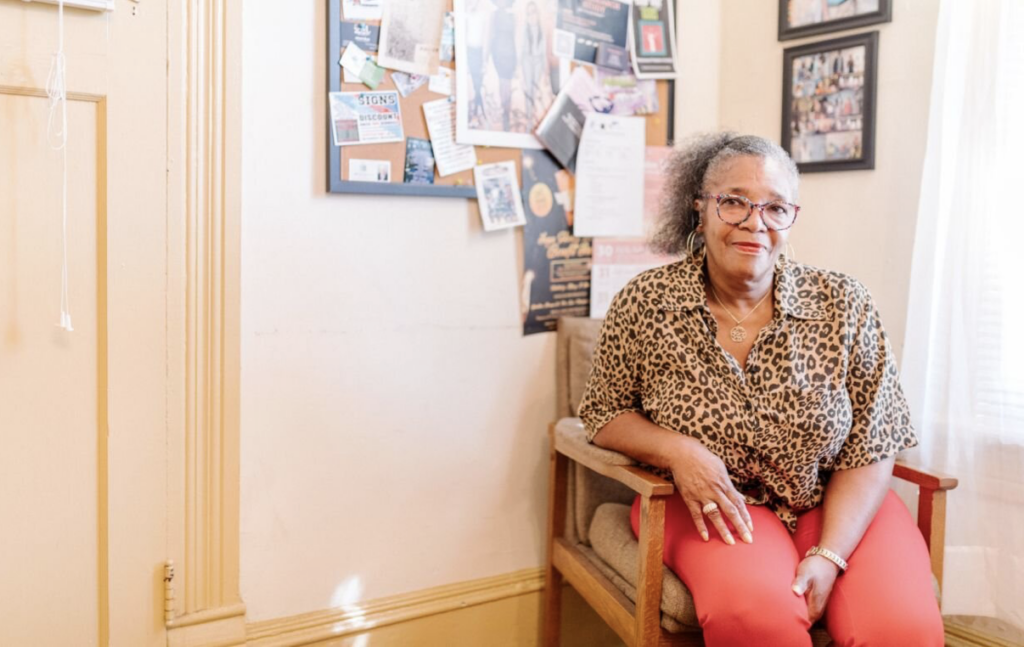
Photo courtesy of Center of Civic Innovation
By Estelle Jarrett | UConn Journalism
February 27, 2024
“There’s nothing you can tell me about the system and how it operates,” says formerly incarcerated Marilynn B. Winn. “I have experienced it, I have lived it, breathed it, ate it, slept on it—I’m a part of it.”
At 17 years old, Winn’s involvement in shoplifting led to her first encounter with the criminal justice system: her first two year sentence of seven in her lifetime. In concentrated poverty areas in inner-city Atlanta, shoplifting was a means of navigating the challenges of everyday life. Growing up as a black girl in 1960s Georgia, she learned early on the harsh realities of poverty and how it led to a cycle of being shut away in Atlanta City Detention Center (ACDC).
Winn was an only child in a single parent home where her mother worked two jobs and her father died in the Army. While she was out all day making ink pens for Scripto and bussing tables, Winn was either by herself or with her grandmother. Winn’s grandmother used to tell her to grab something from the store and hide it before getting to the counter. Her grandmother lived on a plantation in Georgia as a slave and had survived by stealing from the “big house,” according to Winn.
This is where Winn’s habit started. It was food, then dolls, clothes and started to materialize into other things. Winn describes her younger self as a loner, but she would hang around the boys in the neighborhood who also stole often.
Her mother did not know about the stealing until Winn’s first arrest. She’d been angry with her, but she couldn’t stop Winn’s habit at this point in her development. “White kids will go to a psychiatrist to fix behavioral problems– you go to juvenile as a black kid,” said Winn in a 2020 interview with the Center for Civic Innovation.
When Winn first went to prison at 17, it was in the form of a Chain Gang back then which refers to the practice of a group of people chained together to perform menial or physically challenging work as a form of punishment. This system operated well through the 1950s in Georgia. Wardens, or the people in charge of supervising the Chain Gangs with pointed guns, only had third and fourth grade education and the prisons were segregated at the time.
“I never wanted to experience that again. But, when I came home, I thought I’d get jobs like my friends, but I had a record. Employers don’t take the time to see what you were arrested for.”
Winn could not get hired for a job, so she went back to stealing in order to survive, but would get arrested for it many times. She began to lie about her record on job applications and was finally hired. Unfortunately, information about her past incarceration surfaced and she would be fired.
With each brush with the law came the realization that the criminal justice system was ill-equipped to address the root causes of her behavior, perpetuating a cycle of poverty and incarceration that seemed impossible to escape.
“No one ever asked me why do you keep doing this? And all I can say is I needed a job,” Winn said in a 2022 interview with 11Alive.
Being born and raised in the inner-city of Georgia, she knew there are roadblocks for people of color. People get stopped by the police and arrested because they couldn’t afford to buy a decal, car insurance or for a broken taillight. “These are not crimes worthy of prison,” Winn asserted. “Every time you get fingerprinted into that jail, you’ve just received a life sentence, no matter what you did.”
It’s true that Atlanta’s city jail holds low level offenders. According to the jail’s 2020 records, the most common offense in the jail is for driving with a suspended license, with 1,019 people imprisoned for it in 2020. Winn herself was incarcerated there multiple times for driving on a license that she hadn’t realized was suspended and once jailed 30 days when she couldn’t pay a $100 fine.
On her 7th prison sentence, she told a judge she needed something different. In a pivotal moment of courage, she stood before Judge Walter Lovett during one of her court appearances and said, “You keep sending me to prison, and it’s not going to work. I’m going to come back and steal some more because I don’t have a choice in the matter,” according to a 2019 interview with Southern Center for Human Rights.
She then proceeded to explain how she’d lied to obtain 18 separate jobs she couldn’t keep, showing the judge her social security documents to prove it. During her fourth stint in prison, Winn had become addicted to drugs, but managed to get clean during the period of time she had a job and was out of prison.
Judge Lovett’s response was a turning point in Winn’s life. He offered her a lifeline by sending her to Accountability Court which is a court program that provides an alternative to traditional criminal justice punishment and provides support. Winn seized the opportunity and found employment at a staffing company, finally getting the stable job she’d been pleading for.
Winn thrived with First Step Staffing — a non-profit, alternative staffing organization – and worked her way up to be on the board of directors. This kickstarted the extensive work Winn would provide the country and her community. In 2014, she’d receive the Inspire Award from First Step Staffing for her achievements in Community Activism.
Winn didn’t stop there. She went on to co-found Women on the Rise, a grassroots organization advocating for criminal justice reform and reducing the number of women under correctional control in the state of Georgia. This organization nurtures Atlanta, but their reach is local, state-wide and national due to their partnerships with organizations all around the globe. One of the many intentions of Women on the Rise is to provide support groups and welcome home packages for those who have recently been released.
The impact of Women on the Rise is displayed in the many awards Winn has received since starting her work. In 2019, Winn was the Champion for Change Honoree for Washington D.C.’s Salute Her Awards. In 2021, Winn was awarded the John R. Lewis Lifetime Achievement Award from the Center of Civic Innovation for her work with Women on the Rise.
She was also the Lead Organizer for 9to5’s initiative to Ban the Box. Ban the Box referred to the question on employment applications asking about prior felony convictions, the part in the hiring process that prevented Winn from sustaining a job. Atlanta made history by being the first city in the south to ban the box on their employment applications.
Nationally, Winn’s efforts have been recognized by the White House. Winn was a nominee for the United States of Women Summit in 2016. She also served as a Justice Votes Presidential Town Hall delegate in 2020 and later was invited to participate in conversation with members of the Biden-Sanders Unity Task Force on Criminal Justice Reform. She’s also been recognized by President Jimmy Carter and First Lady Roselynn Carter for her work to end employment discrimination in 2014, and became a JustLeadership USA 2016 Fellow.
Today, Winn still lives in Atlanta, GA with her rottweiler, Sassy. At 72 years old, she remains steadfast in her activism, dedicating herself daily to the causes championed by Women on the Rise and other organizations she supports. As Winn said, she knows the prison system intimately. Her parents and grandparents worked on plantations and she has experienced firsthand the dehumanizing conditions of incarceration and being on the line of a Chain Gang when she’d been only a teenager. Despite all this, Winn has broken this cycle with her unwavering resolve to turn an unjust system into something better.
This story was reported and produced as part of an internship with Witness to Mass Incarceration.
